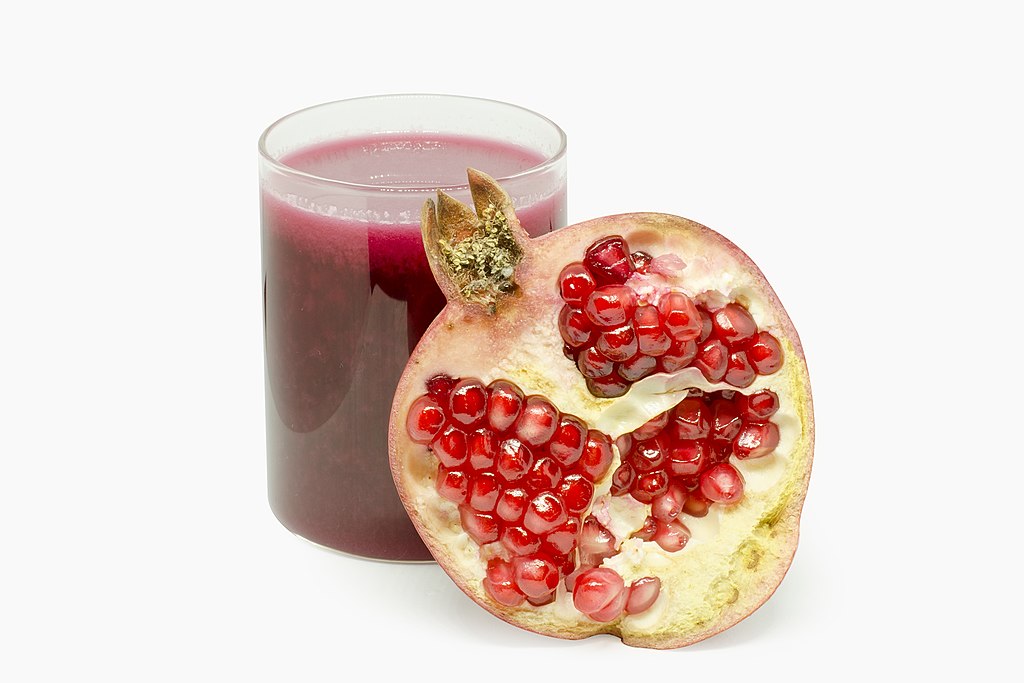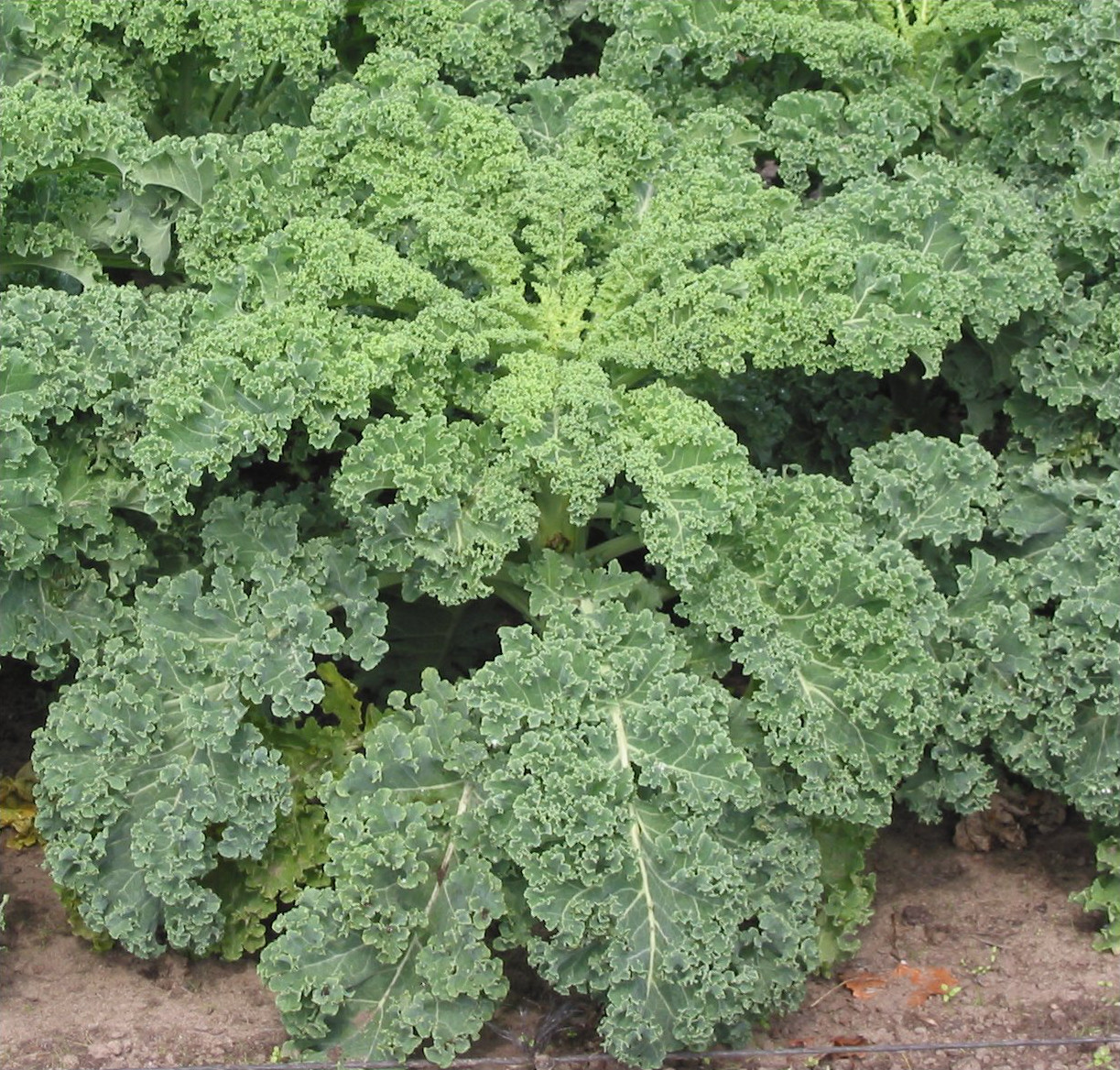Pomegranate Juice vs. Kale
Nutrition comparison of Pomegranate Juice and Kale
Ever wonder how your favorite foods stack up against each other in terms of nutrition?
We compared the nutritional contents of
pomegranate juice
versus
kale
(100g each)
below using 2020 USDA and NIH data[1].
For a quick recap of significant nutrients and differences in pomegranate juice and kale:
- Both pomegranate juice and kale are high in potassium.
- Kale has 11.7 times less sugar than pomegranate juice.
- Kale has 66% less carbohydrates than pomegranate juice.
- Kale has more thiamin, riboflavin, niacin, Vitamin B6 and folate.
- Kale has signficantly more iron than pomegranate juice.
- Kale is an excellent source of Vitamin A, Vitamin C, Vitamin K, calcium and dietary fiber.
USDA sources for nutritional information: Pomegranate Juice (Pomegranate juice, bottled) and Kale (Kale, raw) . Have a correction or suggestions? Shoot us an email.
Calories and Carbs
calories
Pomegranate juice and kale contain similar amounts of calories - pomegranate juice has 54 calories per 100 grams and kale has 35 calories.
For macronutrient ratios, pomegranate juice is much lighter in protein, much heavier in carbs and much lighter in fat compared to kale per calorie. Pomegranate juice has a macronutrient ratio of 1:94:5 and for kale, 28:41:31 for protein, carbohydrates and fat from calories.
Macro Ratios from Calories:
| Pomegranate Juice | Kale | |
|---|---|---|
| Protein | 1% | 28% |
| Carbohydrates | 94% | 41% |
| Fat | 5% | 31% |
| Alcohol | ~ | ~ |
carbohydrates
Kale has 66% less carbohydrates than pomegranate juice - pomegranate juice has 13.1g of total carbs per 100 grams and kale has 4.4g of carbohydrates.
The carbs in pomegranate juice are made of 99% sugar and 1% dietary fiber, whereas the carbs in kale comprise of 81% dietary fiber and 19% sugar.
dietary fiber
Kale is an excellent source of dietary fiber and it has 40 times more dietary fiber than pomegranate juice - pomegranate juice has 0.1g of dietary fiber per 100 grams and kale has 4.1g of dietary fiber.
sugar
Kale has 11.7 times less sugar than pomegranate juice - pomegranate juice has 12.7g of sugar per 100 grams and kale has 0.99g of sugar.
Protein
protein
Kale has 18 times more protein than pomegranate juice - pomegranate juice has 0.15g of protein per 100 grams and kale has 2.9g of protein.
Fat
saturated fat
Both pomegranate juice and kale are low in saturated fat - pomegranate juice has 0.08g of saturated fat per 100 grams and kale has 0.18g of saturated fat.
Vitamins
Vitamin C
Kale is an excellent source of Vitamin C and it has 933 times more Vitamin C than pomegranate juice - pomegranate juice has 0.1mg of Vitamin C per 100 grams and kale has 93.4mg of Vitamin C.
Vitamin A
Kale is an excellent source of Vitamin A and it has more Vitamin A than pomegranate juice - kale has 241ug of Vitamin A per 100 grams and pomegranate juice does not contain significant amounts.
Vitamin E
Pomegranate juice and kale contain similar amounts of Vitamin E - pomegranate juice has 0.38mg of Vitamin E per 100 grams and kale has 0.66mg of Vitamin E.
Vitamin K
Kale is an excellent source of Vitamin K and it has 36 times more Vitamin K than pomegranate juice - pomegranate juice has 10.4ug of Vitamin K per 100 grams and kale has 389.6ug of Vitamin K.
The B Vitamins
Kale has more thiamin, riboflavin, niacin, Vitamin B6 and folate. Both pomegranate juice and kale contain significant amounts of pantothenic acid.
| Pomegranate Juice | Kale | |
|---|---|---|
| Thiamin | 0.015 MG | 0.113 MG |
| Riboflavin | 0.015 MG | 0.347 MG |
| Niacin | 0.233 MG | 1.18 MG |
| Pantothenic acid | 0.285 MG | 0.37 MG |
| Vitamin B6 | 0.04 MG | 0.147 MG |
| Folate | 24 UG | 62 UG |
Minerals
calcium
Kale is an excellent source of calcium and it has 22 times more calcium than pomegranate juice - pomegranate juice has 11mg of calcium per 100 grams and kale has 254mg of calcium.
iron
Kale has signficantly more iron than pomegranate juice - pomegranate juice has 0.1mg of iron per 100 grams and kale has 1.6mg of iron.
potassium
Both pomegranate juice and kale are high in potassium. Kale has 63% more potassium than pomegranate juice - pomegranate juice has 214mg of potassium per 100 grams and kale has 348mg of potassium.
Antioxidants and Phytonutrients
flavonoids
Naturally occuring in fruits and vegetables, flavonoids are associated with many health benefits and used in a variety of medicinal and pharmaceutical applications. [2][3]
For specific flavonoid compounds,
| Pomegranate Juice | Kale | |
|---|---|---|
| Quercetin | 1.11 mg | 22.58 mg |
| isorhamnetin | ~ | 23.6 mg |
| kaempferol | ~ | 46.8 mg |
Omega-3 and Omega-6
omega 6s
Comparing omega-6 fatty acids, kale has more linoleic acid than pomegranate juice per 100 grams.
| Pomegranate Juice | Kale | |
|---|---|---|
| linoleic acid | 0.05 G | 0.291 G |
| other omega 6 | ~ | 0.003 G |
| Total | 0.05 G | 0.294 G |
Customize your serving size
The comparison below is by common portions, e.g. cups, packages. You can also see a more concrete comparison by weight at equal weight (by grams) comparison.
Note: The specific food items compared are: Pomegranate Juice (Pomegranate juice, bottled) and Kale (Kale, raw) .
Pomegranate Juice g
()
|
Daily Values (%) |
Kale g
()
|
|||||
|---|---|---|---|---|---|---|---|
| KCAL % |
|
5% | calories | 5% |
|
KCAL % | |
| G % |
|
5% | carbohydrates | 5% |
|
G % | |
| G % |
|
5% | dietary fiber | 5% |
|
G % | |
| G | 5% | sugar | 5% | G | |||
| G % |
|
5% | total fat | 5% |
|
G % | |
| G % |
|
5% | saturated fat | 5% |
|
G % | |
| G | 5% | monounsaturated fat | 5% | G | |||
| G | 5% | polyunsaturated fat | 5% | G | |||
| G | 5% | trans fat | 5% | G | |||
| MG | 5% | cholesterol | 5% | MG | |||
| MG % |
|
5% | sodium | 5% |
|
MG % | |
| 5% | Vitamins and Minerals | 5% | |||||
| UG % |
|
5% | Vitamin A | 5% |
|
UG % | |
| MG % |
|
5% | Vitamin C | 5% |
|
MG % | |
| IU % |
|
5% | Vitamin D | 5% |
|
IU % | |
| MG % |
|
5% | calcium | 5% |
|
MG % | |
| MG % |
|
5% | iron | 5% |
|
MG % | |
| MG % |
|
5% | magnesium | 5% |
|
MG % | |
| MG % |
|
5% | potassium | 5% |
|
MG % | |
| MG % |
|
5% | thiamin (Vit B1) | 5% |
|
MG % | |
| MG % |
|
5% | riboflavin (Vit B2) | 5% |
|
MG % | |
| MG % |
|
5% | niacin (Vit B3) | 5% |
|
MG % | |
| MG % |
|
5% | Vitamin B6 | 5% |
|
MG % | |
| MG % |
|
5% | pantothenic acid (Vit B5) | 5% |
|
MG % | |
| UG % |
|
5% | folate (Vit B9) | 5% |
|
UG % | |
| UG % |
|
5% | Vitamin B12 | 5% |
|
UG % | |
| MG % |
|
5% | Vitamin E | 5% |
|
MG % | |
| UG % |
|
5% | Vitamin K | 5% |
|
UG % | |
| G % |
|
5% | protein | 5% |
|
G % | |
| UG % |
|
5% | biotin (Vit B7) | 5% |
|
UG % | |
| MG % |
|
5% | choline | 5% |
|
MG % | |
| MG % |
|
5% | chlorine | 5% |
|
MG % | |
| UG % |
|
5% | chromium | 5% |
|
UG % | |
| MG % |
|
5% | copper | 5% |
|
MG % | |
| UG % |
|
5% | fluoride | 5% |
|
UG % | |
| UG % |
|
5% | iodine | 5% |
|
UG % | |
| MG % |
|
5% | manganese | 5% |
|
MG % | |
| UG % |
|
5% | molybdenum | 5% |
|
UG % | |
| MG % |
|
5% | phosphorus | 5% |
|
MG % | |
| UG % |
|
5% | selenium | 5% |
|
UG % | |
| MG % |
|
5% | zinc | 5% |
|
MG % | |
| G | 5% | Water | 5% | G | |||
| G | 5% | Starch | 5% | G | |||
| G | 5% | Alcohol | 5% | G | |||
FAQ
Does pomegranate juice or kale contain more calories in 100 grams?Pomegranate juice and kale contain similar amounts of calories - pomegranate juice has 54 calories in 100g and kale has 35 calories.
Does pomegranate juice or kale have more carbohydrates?
By weight, kale has 70% fewer carbohydrates than pomegranate juice - pomegranate juice has 13.1g of carbs for 100g and kale has 4.4g of carbohydrates. the carbs in pomegranate juice are made of 100% sugar and 0% dietary fiber, whereas the carbs in kale comprise of 80% dietary fiber and 20% sugar.
Does pomegranate juice or kale contain more calcium?
Kale is a rich source of calcium and it has 22 times more calcium than pomegranate juice - pomegranate juice has 11mg of calcium in 100 grams and kale has 254mg of calcium.
Does pomegranate juice or kale contain more potassium?
Both pomegranate juice and kale are high in potassium. Kale has 60% more potassium than pomegranate juice - pomegranate juice has 214mg of potassium in 100 grams and kale has 348mg of potassium.

